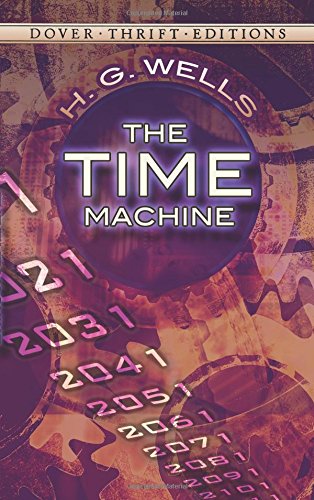Jane and John (not their real names, either) are not unusual; millennials have even been dubbed "the boomerang generation," with an estimated 50% of them choosing to return to the nest. The last time this statistic applied may have been pre-World War I, in an age when more Americans were rural than urban and it was a standard living arrangement for several generations of the same family to share a single dwelling.
There are plenty of economic reasons for the phenomenon. But when Joe and I discussed this, I was in the middle of reading H.G. Wells' classic novel of time travel, The Time Machine. In case you are the one person in a hundred who hasn't either read it, or (more likely) seen the movie from 1960 or the one from 2002, the basic story concerns a scientist who invents a time machine, and travels to the far future of man. There he finds a gentle, beautiful race of people who "do not toil, neither do they spin." They play all day, and sit together in a ruined hall to eat fruit they have picked that day.
At first, the time-traveler is charmed by them, but then he realizes these lovely children are as grasshoppers: they build nothing, plant nothing, preserve nothing; they have no plans for the future. He finds their handful of long-neglected books, crumbling to dust. They ignore a drowning girl, forcing the traveler to leap into the water himself to save her. He muses:
This has ever been the fate of energy in security; it takes to art and to eroticism, and then come languor and decay... [For] Nature never appeals to intelligence until habit and instinct are useless.
Eventually, he discovers that the decadent Eloi are not the last humans. There is a subterranean race, the Morlocks, who continue to work in their dark tunnels while the Eloi play in the sunshine. Wells portrays the Morlocks as cunning cannibals. They live off the sweat of their brows, but also off the Eloi. The scientist-traveler finds fellowship with the Morlocks and their curiosity: they are able to see the value of the traveler's machine, and capable of reverse-engineering it, were he to leave it in their hands.
What has this to do with boomerang millennials?
I'm a Baby-Boomer myself, as is my spouse. But I observe this puzzling cohort, children of the Me Generation. In broad generalizations and likelihoods: Their parents were more likely to be "helicopter parents" than mine. As school-children they had braces, even plastic surgery; got contact lenses rather than glasses to correct their vision, wore $50 jeans and $80 sneakers.
They had TVs (their own TVs, in their bedrooms); they had computers at home. We walked or rode bikes or the bus until we could afford a car and its insurance (often not until college); they were dropped at the door of grade- and middle-schools by parents until old enough for a driver's license. After that, they drove a car with insurance paid for by their parents, or car-pooled with similarly-endowed friends.
They borrowed money for college, either directly from the federal government, or via a federally-guaranteed private loan. Almost all carry smart phones; they use them to play games and music, watch videos, and trade images and messages about their lives and activities. They often delay employment until they can find a job that is "fun" or "rewarding," or a company-culture that matches their own philosophy and values.
More than half thought Bernie Sanders was an excellent choice for President this year.
From my crusty perspective—stay off my lawn!—many of the millennials are Eloi. Not all, of course, because some in every generation are born Morlocks. Some will always choose to be engaged despite the effort required—especially if the alternative is to be at the mercy of a system one can neither control nor persuade.
I don't believe these boomerang Eloi will stay children, either; sooner or later each must step out of their comfort zone and move on to the stress—and rewards—of true adulthood. But Wells' observation gave me food for thought. Can we make life too pleasant for our young offspring, thus guaranteeing for them a future of permanent, unproductive victimhood?
What, unless biological science is a mass of errors, is the cause of human intelligence and vigour? Hardship and freedom: conditions under which the active, strong, and subtle survive and the weaker go to the wall...

No comments:
Post a Comment